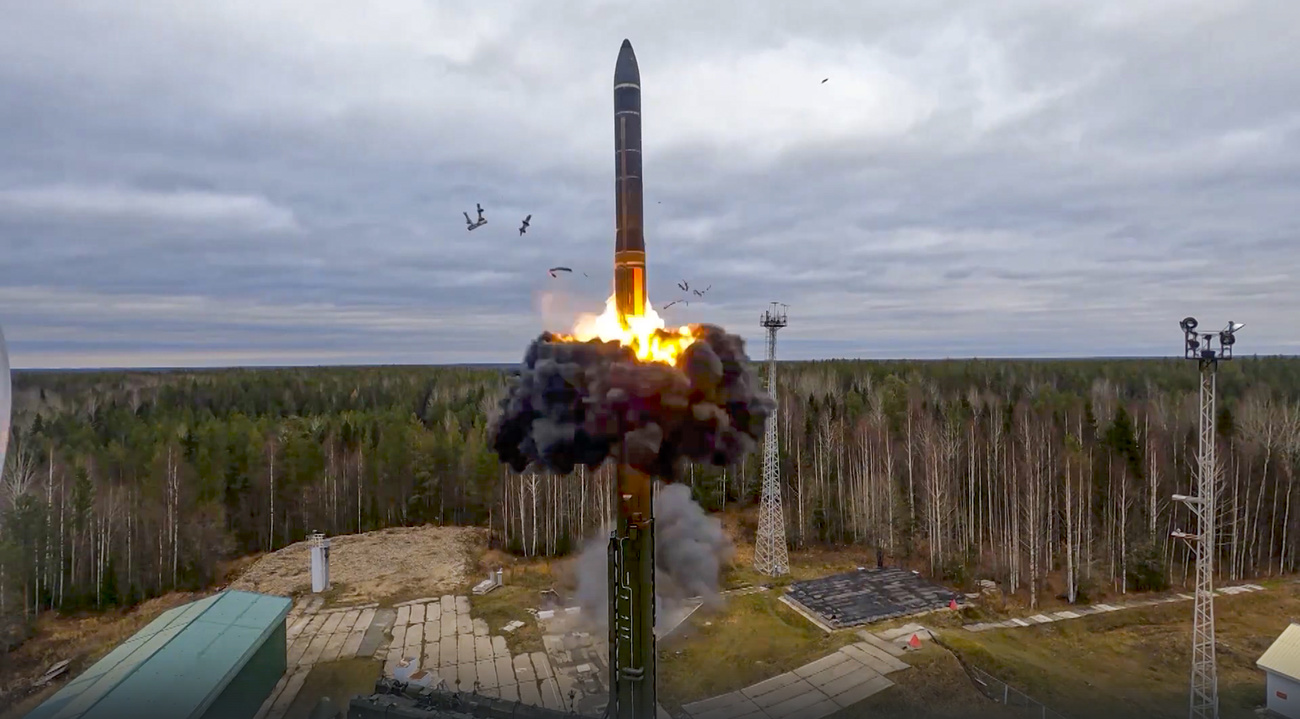
War in Ukraine erodes European support for humanitarian disarmament

The withdrawal of Lithuania from the convention banning cluster munitions has raised concerns among NGOs that this decision will encourage other states, worried about their own security, to disassociate themselves from treaties designed to protect civilians in wartime.
The news broke in the middle of the summer. On 18 July, the Lithuanian parliament decided to withdraw from the Oslo Convention, an international treaty that bans the use, production, and transfer of cluster munitions, deemed too harmful for civilian populations. Since its introduction in 2008, 111 States have ratified it.
Vilnius justified its decision by arguing that it would be “a mistake” for a country preparing its defence to deprive itself of these weapons when Russia is using them in its war in Ukraine.
The Convention on Cluster Munitions is one of the pillars of humanitarian disarmament, which consists of five conventions banning entire classes of weapons. The other four treaties prohibit landmines, biological, chemical, and nuclear weapons. No country had ever withdrawn from any of them.
The historic decision sent shockwaves through Geneva. “It really flies in the face of everything that international humanitarian law stands for,” says Tamar Gabelnick, director of the Cluster Munition CoalitionExternal link, that brings together NGOs that have campaigned for a ban on these bombs, which before hitting their target, scatter explosive fragments. “The aim of this legal framework is to protect civilians during armed conflict,” she points out. “So if a country is concerned that armed conflict might arise, it’s exactly the wrong time to leave a convention that’s meant to protect its own civilians.”
The war in Ukraine has turned the security landscape in Europe upside down, so much so that NGOs active in the fields of disarmament and humanitarian aid, as well as part of the international community, fear that other states will follow Lithuania’s lead.
Usually reluctant to point the finger at individual countries, the International Committee of the Red Cross (ICRC) reacted immediately with a press releaseExternal link. The Geneva-based organisation, which is the guardian of the rules of war, said it was concerned that Lithuania’s withdrawal would send out a signal that these treaties, adopted in times of peace, could be abandoned in times of war.

More
Threat of nuclear war paralyses International Geneva
Fear of Russian aggression
Lithuania says that any cluster munitions its army may one day use will be used for defence purposes. “Conventions are important when all countries sign up to them,” Lithuanian defence minister Laurynas Kasciunas told parliamentExternal link. He pointed out that Russia had not signed the Convention on Cluster Munitions, weapons that the country is using in Ukraine. “It would be a mistake for a country preparing to defend itself to indicate what means it will not use,” he added.
But this argument fails to convince NGOs, who point out that Lithuania, historically a good pupil of humanitarian disarmament, has never had this type of weapons and has therefore never trained with them. According to Gabelnick, cluster bombs have only limited military utility, but their negative effects on civilians and on the reconstruction of a country after war are very real.
The number of victims caused by these devices is closely monitored by the Cluster Munition Coalition. According to its latest reportExternal link, published in September, 93% of the victims of these weapons in 2023 were civilians. This is due to their wide impact radius and the large proportion of fragments that do not explode when they hit the ground. These continue to kill and injure for years, even decades, after the end of hostilities. Children, who tend to mistake these fragments for toys, account for 47% of the victims.

Domino effect?
NGOs are worried that other countries will follow in Lithuania’s footsteps. “We fear that this will create a domino effect, as other countries are likely to feel threatened by their neighbour,” says Daniel Suda-Lang, director of the Swiss branch of Handicap International.
To date, no other state has indicated its intention to leave the Convention on Cluster Munitions. However, at the beginning of the year, a campaign was launchedExternal link in Latvia to get the country, a former Soviet republic and direct neighbour of Russia, to leave the Ottawa Convention, which has banned landmines since the end of the 1990s. The stated aim: to protect the country from possible aggression by Russia. However, the Latvian defence minister has since said that there is no justification for such a withdrawal.
“It is not surprising that the Baltic States think that the defence of their borders could be reinforced by anti-personnel mines. Finland joined the treaty on these devices very late, partly because it wanted to defend its border with Russia,” explains Keith Krause, professor of international relations at the Geneva Graduate Institute. “But no one anticipated the kind of large-scale aggression we are now seeing in Europe. The preconditions for humanitarian disarmament no longer seem to be in place.”
Like most major powers, the United States has not signed the Convention on Cluster Munitions. Since the start of Russia’s invasion of Ukraine, Washington has sent part of its stockpile to Ukraine, which is also a non-signatory to the treaty and is using them to defend itself against Russian troops.
But these transfers are also causing concern. “Providing Ukraine with cluster weapons could serve to destigmatize them and runs counter to international efforts to end their use,” writes Robert Goldman, a law professor at American University in Washington, D.C., on The ConversationExternal link. “And that, in turn, could encourage – or excuse – their use by other states that may be less responsible.”
Timid European response
Lithuania’s decision elicited little reaction from European capitals. The day after it was announced, only two countriesExternal link, Norway and Austria, had expressed regret at the decision.
It was not until September and the meeting of the States Parties to the Convention, held at the Palais des Nations in Geneva, that a few countries decided to voice their concern. At the meeting, around ten states took the floor to share their disappointment and call on the Lithuanian authorities to reverse their decision. Lithuania has six months to change its mind before the withdrawal takes effect.
The timid reactions of NATO powers, of which Lithuania is a member, have not reassured NGOs, which would have liked to hear firmer words, particularly from France and Germany, who have remained silent on this case. “We need strong reactions from other states, especially European countries and NATO members, to show that there’s a political price for withdrawing from one of these conventions,” explains Gabelnick of the Cluster Munition Coalition.
For its part, Switzerland also waited until the meeting of States Parties to express its “regret” at this decision. “As the depositary of the Geneva Conventions and a country proud of its humanitarian tradition, Switzerland has a responsibility to make its voice heard more,” says Suda-Lang of Handicap International in Switzerland. “We are convinced that our minister of foreign affairs should be more present to denounce what is happening in the world, particularly in Lithuania.”
The Federal Department of Foreign Affairs (FDFA) told SWI swissinfo.ch that it had “expressed its concerns on this matter” and “invited Lithuania to reassess its decision” at the meeting in Geneva, as well as publicly on XExternal link. It also said that it had taken steps in advance of the Lithuanian parliament’s decision “through bilateral contacts between the respective foreign ministries”.
Erosion of international law
Some experts argue that these events reflect a real decline in humanitarian disarmament.
“There is definitely an erosion of commitment to humanitarian disarmament, but also to the whole architecture of global disarmament,” says Krause of the Geneva Graduate Institute. The US withdrawal from the Intermediate-Range Nuclear Forces (INF) Treaty in 2019 and Russia’s exit from the Comprehensive Nuclear Test Ban Treaty (CTBT) in 2023 are examples of this.
The repeated violations of international humanitarian law in the wars in Ukraine, the Middle East and Sudan, and the double standards applied by certain states when it comes to condemning the perpetrators, give rise to fears of a real weakening of the international standards designed to protect the victims of war.
This trend is not new, but it seems to be accelerating, says Krause. “It is the result of a wider geopolitical shift where states are not satisfied with the outcomes or constraints implied by the rules-based world order.”
Edited by Virginie Mangin

In compliance with the JTI standards
More: SWI swissinfo.ch certified by the Journalism Trust Initiative































You can find an overview of ongoing debates with our journalists here . Please join us!
If you want to start a conversation about a topic raised in this article or want to report factual errors, email us at english@swissinfo.ch.